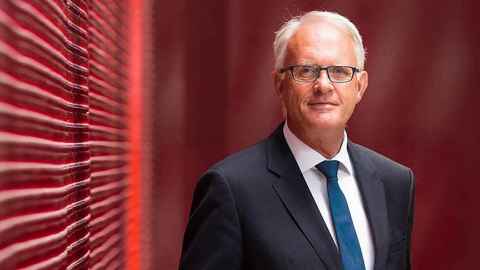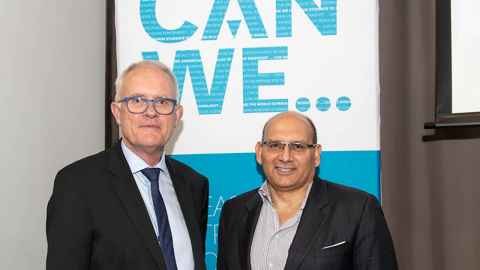Five months on from Stuart McCutcheon's death, colleagues reflect
23 May 2023
Writing for Ingenio magazine, three former colleagues share their memories of the late former vice-chancellor.

Stuart demanded loyalty, but returned that loyalty with trust and support.
Reflections on Emeritus Professor Stuart McCutcheon
10 November 1954 – 6 January 2023
Emeritus Professor Stuart McCutcheon was vice-chancellor of the University of Auckland from 2005-2020. He passed away suddenly from a heart attack just a few years into his retirement. Three friends and colleagues reflect on his contributions.
Professor John Fraser, Dean, Faculty of Medical and Health Sciences
Stuart was a mentor, colleague, golfing buddy and friend. He was blessed with natural mana and extraordinary leadership qualities. He was selfless, humble, smart, witty, personable, fair and genuinely caring. He could light up a room with his stature and easy nature, and could converse with anyone about anything, from student to donor to university staff he didn’t know.
My first interaction with Stuart was just before he became vice-chancellor. We shared a table at a meeting, and my notes from that day read “new VC is warm, affable, funny”. After 15 years at the helm of New Zealand’s largest university, Stuart was still warm, affable and funny.
He also had an unflinching commitment to ensure the University remained internationally respected – recognised for its people, teaching, research and innovation. Everything he did during his term reflected that commitment. Nothing made him prouder than when our reputation was confirmed by international accolades, or an alumnus was recognised for something remarkable. He would say with his warm smile, “Isn’t that why we’re here!”
He was admired by the wider University community, even those with whom he sometimes clashed. Many political masters did not share his passion for quality, inclusive higher education or were unwilling to acknowledge the essential contribution a university makes to society, which to Stuart was a constant frustration.
I have a favourite quote from Harry Truman: “It’s amazing what you can accomplish when you don’t care who gets the credit”, which aptly describes Stuart’s approach. Stuart built effective teams and rarely sought credit himself but was quick to pass on credit and praise to others.
Shortly after his arrival as VC in 2005, he asked for a tour of the Grafton Campus. We spent an afternoon stalking the old rooms and narrow corridors, after which he quipped, “This adds new meaning to the term deferred maintenance.”
Soon after, a business case was submitted for Grafton. He deflected any credit for this massive initiative to others. Major rebuilds of the Science and Engineering campuses followed, along with student facilities. Many of the facilities we now enjoy stem from Stuart’s focus on creating a world-class experience for students and staff.
As a boss, Stuart was clear about his expectations. He demanded loyalty, but returned that loyalty with trust and support. Rather unnervingly, Stuart seemed to be across everything that was happening, and had an acutely accurate memory for people and events. What he disliked most was surprises and he expected to be informed of anything with the potential to blow up, no matter how trivial it might seem. This meant phone calls, text messages and emails, sometimes at night – which were always received promptly and with thanks. Once informed, he had your back.
My wife Tam and I were privileged to share a friendship with Stuart and his wife Deborah and, the weekend before he died, we had a lovely lunch with them. Stuart and I had played a round of golf in which he was his usual self, talking enthusiastically about his new fitness regime, the new golf clubs he had purchased, and exciting plans for the coming year. But they weren’t to be.
The world is a less interesting place without Stuart, but he leaves an indelible legacy. He modernised our University, led two philanthropic campaigns that were the largest in the country, and built a community of committed donors and friends through his personality and ability to convey a vision.
On behalf of the entire Waipapa Taumata Rau, University of Auckland community – staff, students, alumni and friends he came into contact with through his role – Vale Stuart.

Stuart was fearlessly clear about what he needed to know and the decisions he was deliberating. I admired this quality.
Rt Hon Dame Cindy Kiro,
Governor-General of New Zealand
He hono tāngata e kore e motu; kā pā he taura waka e motu.
Unlike a canoe rope, a human connection cannot be broken.
The last time I saw Stuart was at my farewell in 2022 at Old Government House. He was enjoying his retirement life, busy doing what he valued and glad to be rid of the regular grind. Not doing much fishing, though – despite promising to do so when he left. He was living a full life.
I worked with Stuart at three universities over nearly 30 years: Massey, Victoria and the University of Auckland. We joked that I followed him around, and while this was coincidental, it certainly appeared my career trajectory was somewhat aligned with where he had located.
My earliest memory of him was in his role as DVC Research at Massey University. He encouraged me to pursue my research interests and was keenly supportive of my various research applications, scholarships and projects. We didn’t work regularly together, but it made a big difference to an early-career Māori academic to have his clear support.
Our next contact was when I became a professor at Victoria University of Wellington where he was vice-chancellor. We didn’t have a close working relationship, but again I always felt free to have frank discussions and debates with him about anything to do with the university and tertiary education sector.
His fierce intellect was always evident, meaning you had better make sure you knew what you were talking about!
Our last contact was the longest and most significant because I was able to work alongside him while I was a professor in education, director of Starpath, director of the Atlantic Fellowship Programme for Social Equity and as pro vice-chancellor Māori at Waipapa Taumata Rau.
Stuart was consistent. I knew what to expect. He was fearlessly clear about what he needed to know and the decisions he was deliberating. I admired this quality. He would take a punt on someone and back them, just as he had with me. His openness was a quality that stemmed in some part from his being from Manawatu. He would say, “You could take the boy out of Manawatu, but not Manawatu out of the boy.” Pragmatism, honesty and clarity were parts of this character.
I saw his love for his wife Deborah and his pride in their sons and wider family, and his closeness to those whom he’d championed.
He was an important leader for the tertiary education sector in a period of rising quality and internationalism and a proud New Zealander. We should, as a country, acknowledge the passing of someone who had been a rock for this sector for many decades.
Moe mai rā e hoa.

I’ll remember him beyond his accomplishments and contributions, as someone enduringly life-affirming, a man with striking humanity.
Peter Rajsingh, Chair of US Friends of the University of Auckland
My last meeting with Stuart involved torrential rain in New York with not a cab in sight. The subway, a few blocks from our destination, was impossible to exit without getting soaked. A fellow Auckland alum miraculously appeared and handed me an umbrella, procured from a nearby street vendor. I felt thankful for the Kiwi kindness and we headed to our event, where I was about to do something expressly against Stuart’s wishes.
This was his final evening with us as vice-chancellor. As the Chair of the US Friends, I was under strict instructions that he did not want a fuss, to my mind the tallest of tall orders. How could one not summon cheers for a man whose extraordinary vision, leadership, character, and personality we all deeply appreciated, and whose presence was the highlight of many such gatherings.
I am happy to report that although a little embarrassed, Stuart took it all in his stride. After an initial raised eyebrow, his graciousness trumped humility and not standing on ceremony, other superlative Stuart qualities.
After that last face-to-face encounter, we frequently emailed or communicated on WhatsApp. He was always able to summon a perfectly calibrated remark, whether of levity or gravitas, as the situation demanded. He could make you laugh with a hilarious comment and was the perfect interlocutor to share an irreverent meme. In a world where these qualities at times appear less prized or in short supply, what I applaud Stuart for, in every interaction, was his persistent candour and common sense.
For me, his straightforwardness of soul posed the question: was this something Kiwi, or particular to him? Was it the water in Palmerston North that made him so easy to be around, possessed of such a smooth and effortless personality? Or was he so cool from his arcane knowledge of thermoregulation in lambs? Stuart was both a quintessential Kiwi and exemplary cosmopolitan. In New York, you would call him a mensch, a Yiddish term for someone of integrity and dignity, with a sense of what is right and responsible – an appellation well-deserved. You could also term him a not-so-brash New Yorker since when he came to town, he did Manhattan like a native.
Stuart also had an enduringly boyish quality, an eternal youth almost, which makes his passing such a shock and anomaly in time. I’ll remember him beyond his accomplishments and contributions, as someone enduringly life-affirming, a man with striking humanity. I am grateful for his companionship and for the way he touched us so profoundly – for his humour and sound judgement, his dignity, his joy.
This tribute first appeared in Ingenio Autumn 2023.